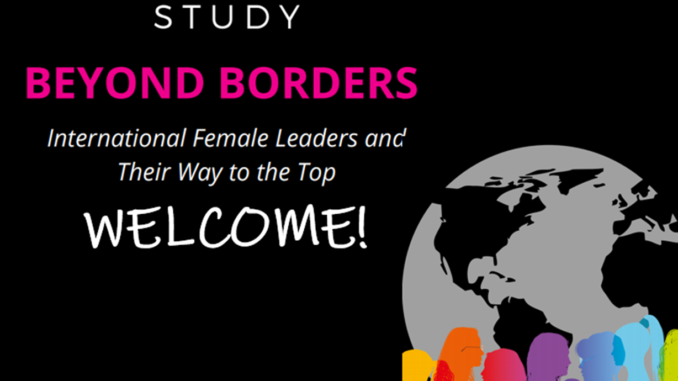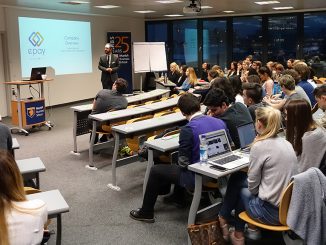
On the evening of March 8, MBS professors Dr. Patricia Kraft and Dr. Ellen Schmid as well as MBA student Giulia De Anna presented the results of the current study “International Female Leaders and Their Way to the Top” at the first Beyond Border Talk of the women’s network Mission Female. As part of its Women in Leadership initiative, Munich Business School thus joined the worldwide campaigns for International Women’s Day, which is celebrated annually on March 8 to draw attention to women’s rights and the (lack of) gender equality.
As part of her master’s thesis, Giulia De Anna, who has been interested in the dimensions of diversity for several years and also wanted to address this topic in her thesis, collaborated with Mission Female. Mission Female is a Germany-based career network for women with over 70 members, whose mission is to improve career opportunities for women, to increase the visibility of successful women, and to help women develop personally and professionally through shared exchange across industries. Together with Mission Female, Giulia de Anna, Prof. Dr. Patricia Kraft and Prof. Dr. Ellen Schmid identified three countries as the object of investigation for the central study question “What are barriers and success factors for female leaders?”: the USA, Sweden and the Netherlands. The reason for this selection is that in all three countries, different historical, structural, organizational and societal conditions prevail with regard to, for example, the percentage of women in board positions or the existence of quotas and support services, and thus different success factors and barriers could also be assumed.
Giulia de Anna conducted twelve qualitative interviews with female executives from various industries in the countries mentioned. All executives were in upper-management positions and had an average of 25 years of professional experience. Giulia De Anna categorized the responses from the open question setting in terms of four different factors that, according to prior research, can represent both barriers and success factors: individual, interpersonal, organizational, and societal. The results of the study are surprising. Despite the diversity of the countries selected, the study was able to show that success factors and barriers are perceived identically in all three countries. Interpersonal and individual factors such as the existence of business networks, mentors and self-confidence are identified as success factors across all countries, while social and organizational factors play only a subordinate role. With regard to barriers, however, the picture is exactly the opposite: here, organizational and social factors, i.e. prejudices, stereotypes and quotas, are perceived as the greatest – mostly invisible – hurdles.
For the researchers, this is a great result: Instead of lamenting the organizational and societal barriers, they believe one should focus much more on the success factors. It is precisely the individual and interpersonal factors that can be further promoted with coaching and networking activities, while the upheaval of organizational and societal structures often takes more time.
After the brief introduction to the study, Frederike Probert, CEO of Mission Female and moderator of the first Beyond Border Talk, opened the discussion and started directly with the pointed question of whether the study results were valid for the whole world. Due to the small sample size and the focus on countries with a Western standard of living, this must of course be answered in the negative, although the study shows that the frequently used argument “We can’t compare our situation with that of women in country xyz.” is not undoubtedly true, explained Prof. Dr. Patricia Kraft, Prof. Dr. Ellen Schmid and Giulia De Anna. Many of the audience members – including a large number of men, by the way – were interested in a continuation of the study and suggested various other countries, such as China, India, Canada, Mexico, Colombia or Switzerland, as a basis for investigation.
The evening concluded with a collection of personal success factors of the participants, including demanding opportunities, making oneself visible and believing in one’s own competencies, having supporters in and outside the company, acting as a role model and stepping out of one’s own comfort zone, and repeatedly building relationships. Frederike Probert’s personal tip and task for all (future) female executives: Be clear about what you want your career path to look like, think about who and what you need to achieve these goals, and then just get started!
The complete study "Beyond Borders: International Female Leaders and Their Way to the Top" can be read here.



